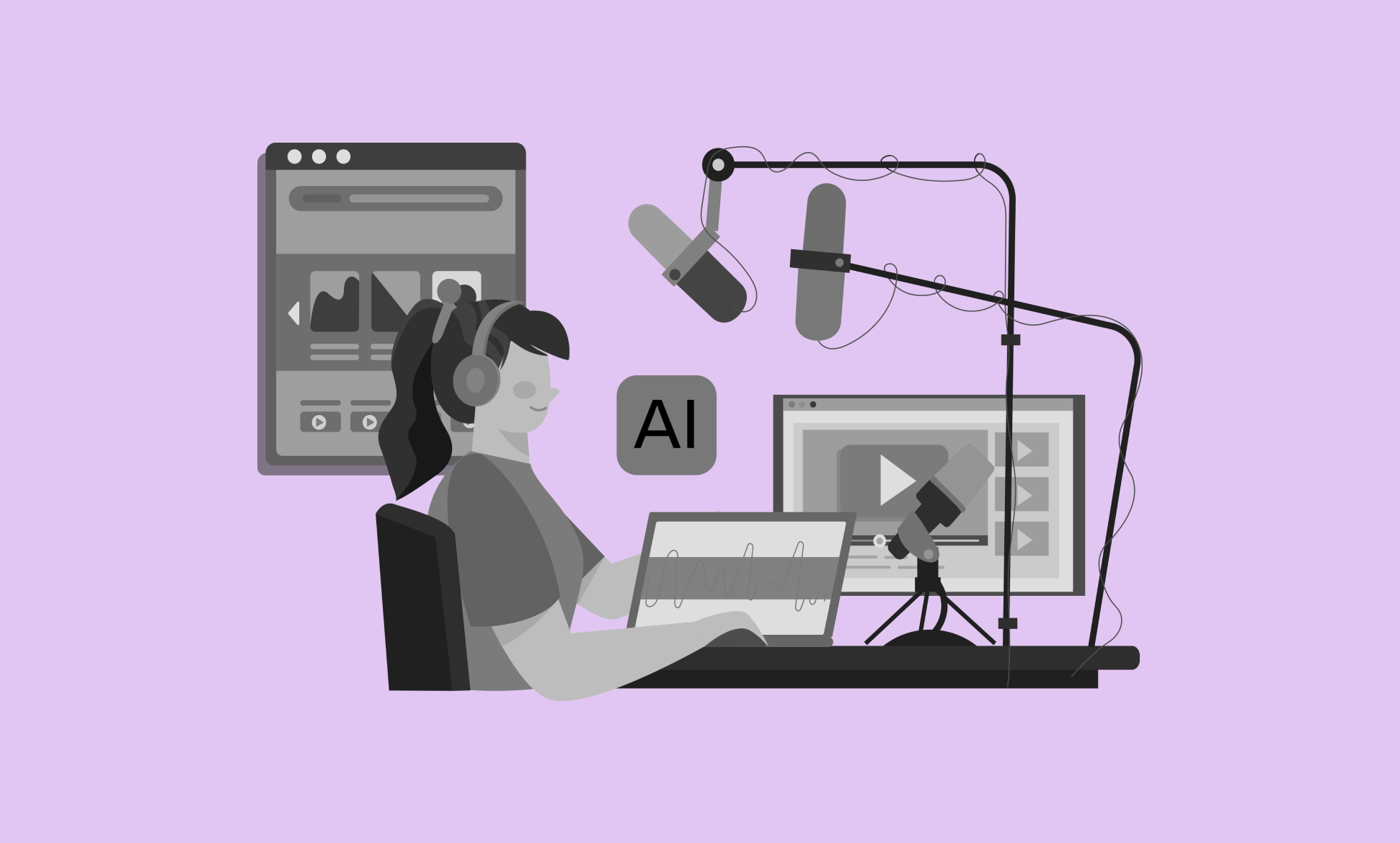Chartable, known for its podcast charts, SmartLinks, and SmartPromos, has officially announced it will be closing its doors for Megaphone users on December 8th, 2025.
This leaves many brands, agencies, networks, and pro-podcasters alike on the hunt to find a suitable alternative to optimize content and streamline their podcasting workflow.
That’s why we’ll be sharing the best Chartable alternatives on the market.
A quick review of Chartable
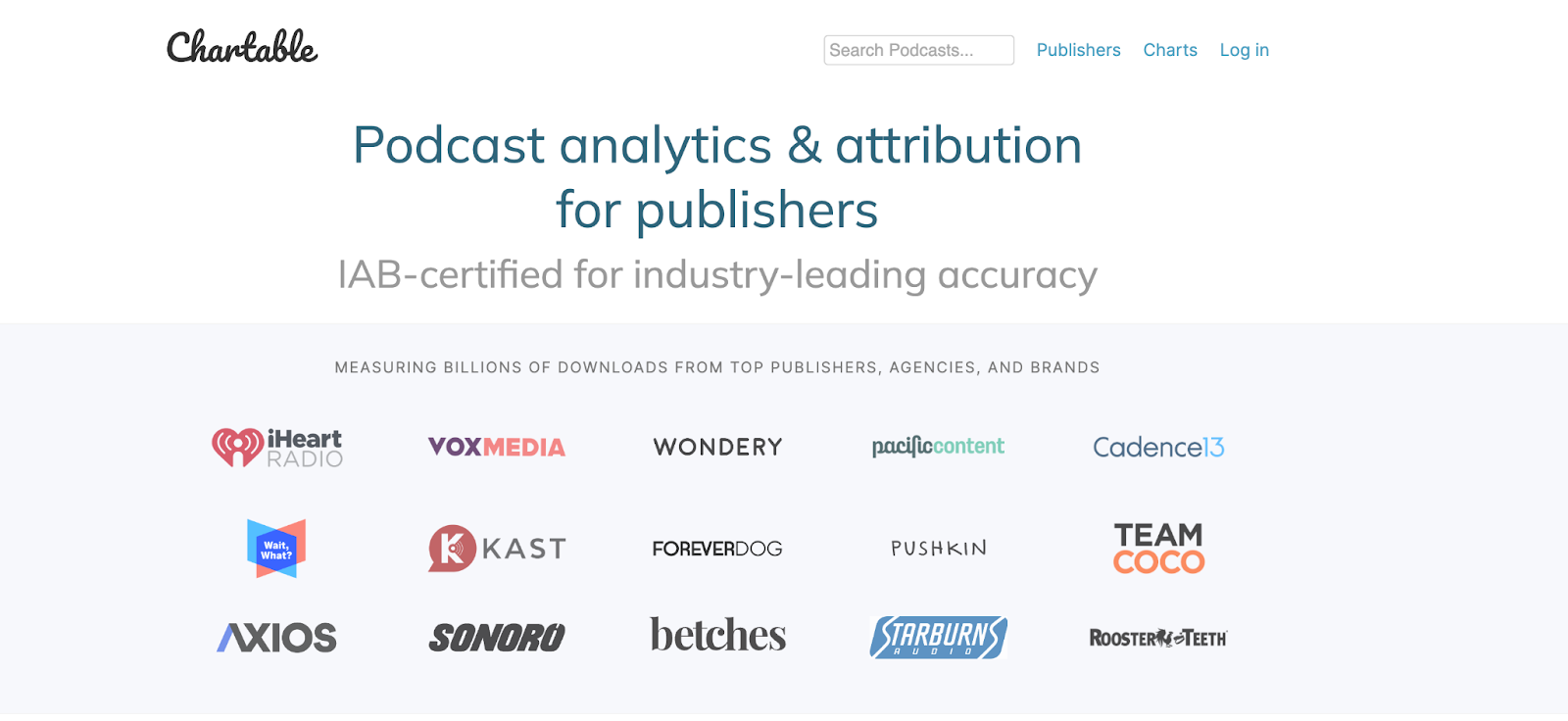
Before we get started on the alternatives, let’s dive into a quick recap of Chartable and its offerings, so you can find a new platform that has all the features you rely on most.
Key features:
- SmartLinks: Trackable URLs let you know how listeners found your show and which marketing campaigns were the most effective
- SmartPromos: Track and measure the impact of podcast advertisements on your downloads
- Demographic data: Based on household and only available to US users
- Reports: Key metrics report with rolling 30-day numbers and additional reports collected by episode, platform, and country
Pros:
- SmartLinks offered trackable URLs that show podcasters how listeners found their show and which marketing messages resonated the most with them
- SmartPromos feature allowed podcasters to track and measure the impact of their advertisements on their download numbers
- Reliable and cost-effective measurement
- IAB certified
Cons:
- You needed to create a different SmartLink for every promotional channel, there is no way to share one consolidated link. For example, if you make your Twitter SmartLink but someone accidentally shares it on LinkedIn, it will track as a Twitter listener
- Advanced demographic data was only available for US audiences
- Did not offer in-depth podcast analytics or audience data
- Limited reporting customization because their variety of data is relatively small
- No podcast hosting capabilities if you want an all-in-one platform
Chartable for Brands
In 2023, Chartable announced that they were sunsetting one of their popular features among brands and agencies, Chartable for Brands. This feature provided users with insights into which companies were listening to their podcasts. Luckily for any previous users of Chartable for Brands, we have alternatives listed below for this feature as well.
Now let’s get into the top 10 Chartable alternatives for 2025.
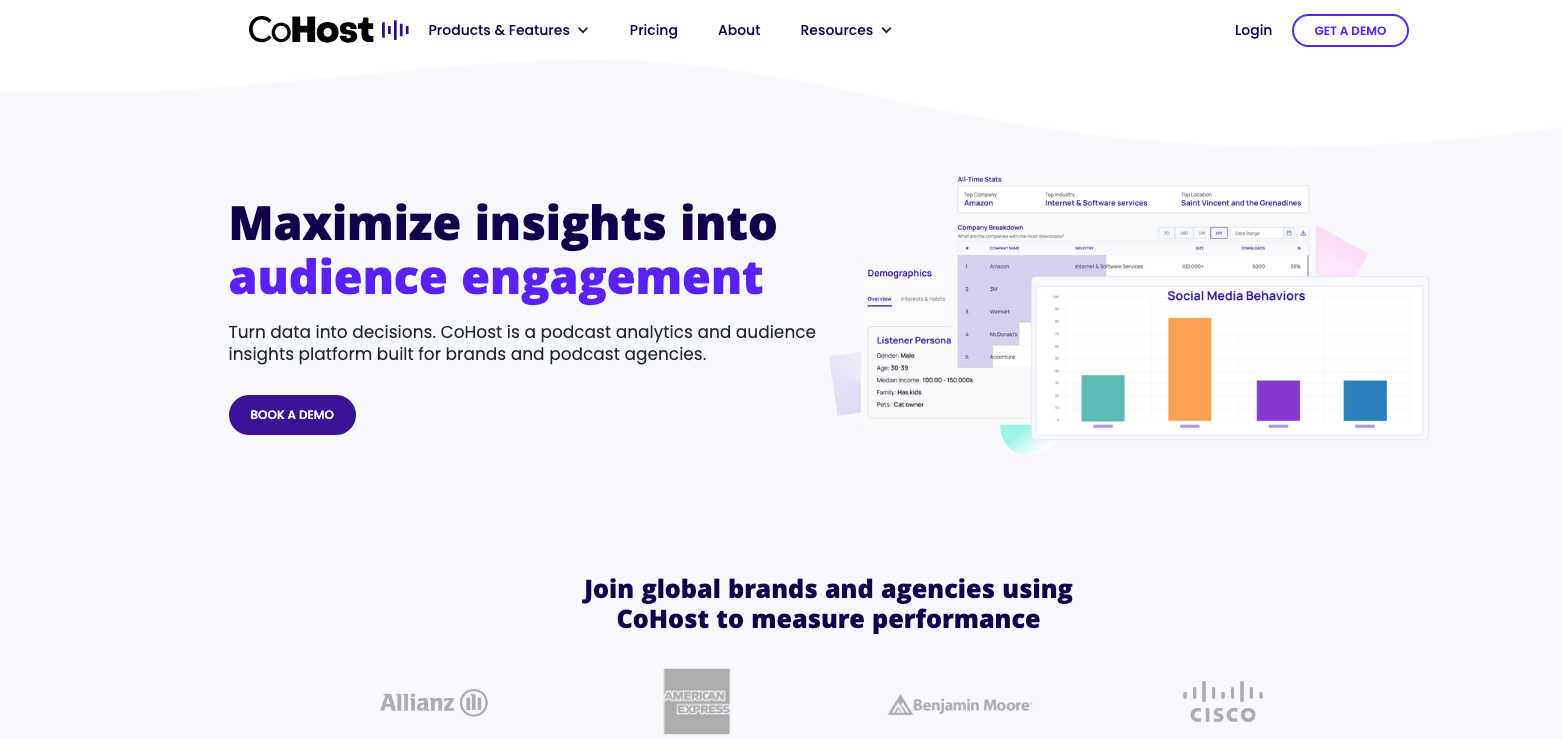
1. CoHost
Created by the award-winning podcast agency, Quill, CoHost is a podcast analytics and insights tool providing brands and agencies with essential data to understand their audience and measure the reach, growth, and impact of podcasts.
Trusted by leading brands and agencies, like PwC, iHeart Media, JAR Audio, and Expedia, CoHost provides users with industry-leading insights and tools.
CoHost’s Prefix: Advanced analytics no matter your hosting provider
CoHost's Prefix allows brands and agencies to gain industry-leading analytics and audience insights from CoHost – regardless of your current hosting platform. CoHost simply integrates with your existing hosting platform, like Simplecast, Buzzsprout, Podbean, and more.
Here’s what is currently offered in Prefix plans:
- B2B Analytics: Firmographics insights, including company size, revenue, and industry, alongside listener job title and seniority.
- Advanced Audience Demographics: Advanced demographics and psychographics, including age, social media habits, lifestyle type, and more.
- Tracking Links: See which episodes and marketing channels are driving the most downloads.
- Show Analytics Manager: Receive a detailed view of your show’s performance, audience profile, and growth – all in one place.
Using the tools above, you’ll be able to tailor your content to listener preferences, drive growth by understanding listener behavior, and verify if your show is reaching your target audience.
Try out CoHost for yourself – your first week is on us.
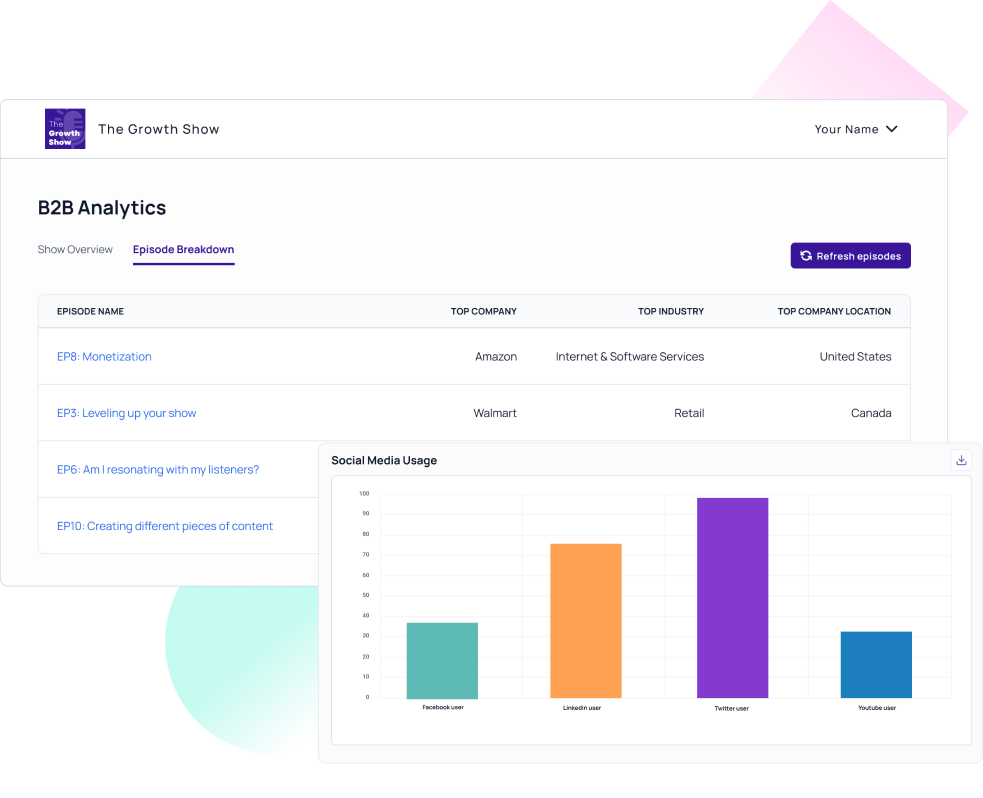
Key Features:
- Advanced Audience Demographics: Verify if podcasts are reaching your desired target audience by gaining insight into your listeners' age, gender, household income, family members, lifestyle, hobbies, social media habits, and more.
- B2B Analytics: Discover which companies your listeners work at and their industry, size, location, and average revenue through an exportable list. Users can view this data on both a show and episode level.
- Tracking Links: CoHost’s Tracking Links allow users to track clicks to downloads across multiple marketing channels all through one single link. Discover top download sources, individual link analytics, and a consolidated LinkTree style display.
- In-Depth Analytics Dashboards: Dashboards including show and episode consumption rates, growth rates, top episode vs. latest episode insights, and downloads and unique listener data.
- Automatic Transcriptions: In-app AI-powered transcription tool for effortless editing, distribution, boosted SEO, and accessibility. This feature comes at no additional cost to your CoHost podcast hosting plan.
- Consumption Data: Detailed podcast consumption data from Apple and Spotify, including show and episode consumption rates and total listen time, helping creators understand how audiences engage with their content.
Pros:
- Prefix available for users who require advanced podcast analytics and audience insights but do not want or cannot change their current hosting setup
- In-depth and comprehensive audience demographic data and listener profiles through B2B Analytics and Advanced Audience Demographics
- Podcast tracking links can be shared across marketing channels with one consolidated link
- AI-powered podcast transcriptions come at no extra cost to your hosting package
- Insert pre- and post-roll audio into your podcast to monetize and dynamically edit your content
- Separated downloads and unique listener dashboards to compare listener data
- Unlimited multi-show management and team members within your account
- IAB certified
Cons:
- Does not support video podcasts
- No mobile app
- Currently, no mid-roll ad insertion is available
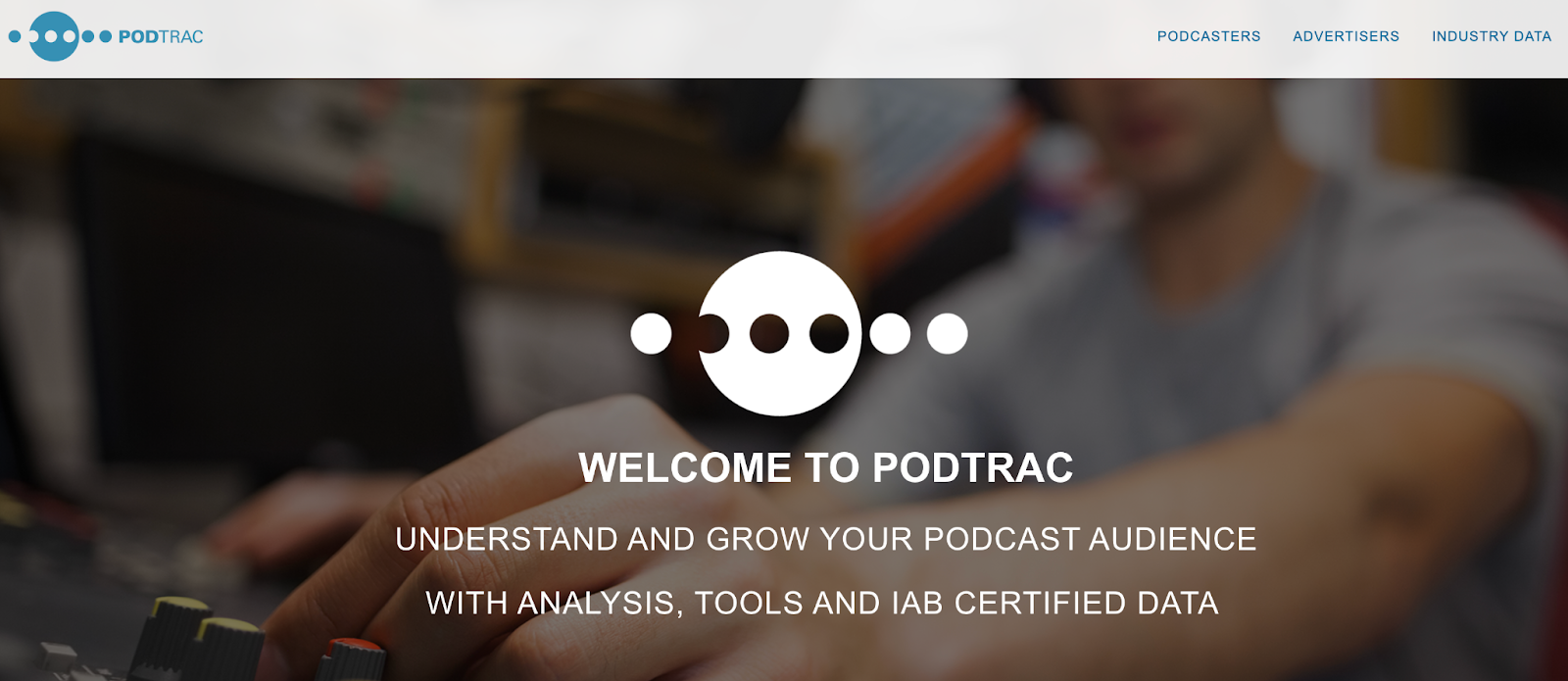
2. Podtrac
Podtrac is designed to empower podcast creators in understanding, expanding, and monetizing their audience. With a focus on analysis, tools, and IAB-certified data, Podtrac equips podcasters with the insights they need to gain a deep understanding of their audience, implement strategic growth plans, and explore monetization opportunities.
Podtrac also offers valuable resources, including monthly rankings, weekly trend updates, and industry insights, enabling podcasters to stay informed about changes in the podcasting landscape.
Key features:
- Demographics: Collected by a survey developed by audience research professionals
- Advertiser planning data: Provides a ranking of top publishers and podcasts based on unique audience counts
- Podcast traffic measurement: Understand your audience with accurate, IAB-certified, third-party podcast measurement data
- Podcast ad attribution: Includes metrics like delivered impressions, visits, sales, purchases, conversion rate, and cost per sale
Pros:
- IAB-certified
- Consistent access to your show’s traffic and demographics data regardless of whether you change hosting platforms
- Cost-effective and easy to use
- Reliable ad attribution for publishers
Cons:
- Non-customizable reporting
- No in-depth analytics data
- Limited podcast growth features
- Demographic data is self-reported through listener surveys
- No podcast hosting features if you’re looking for an all-in-one solution
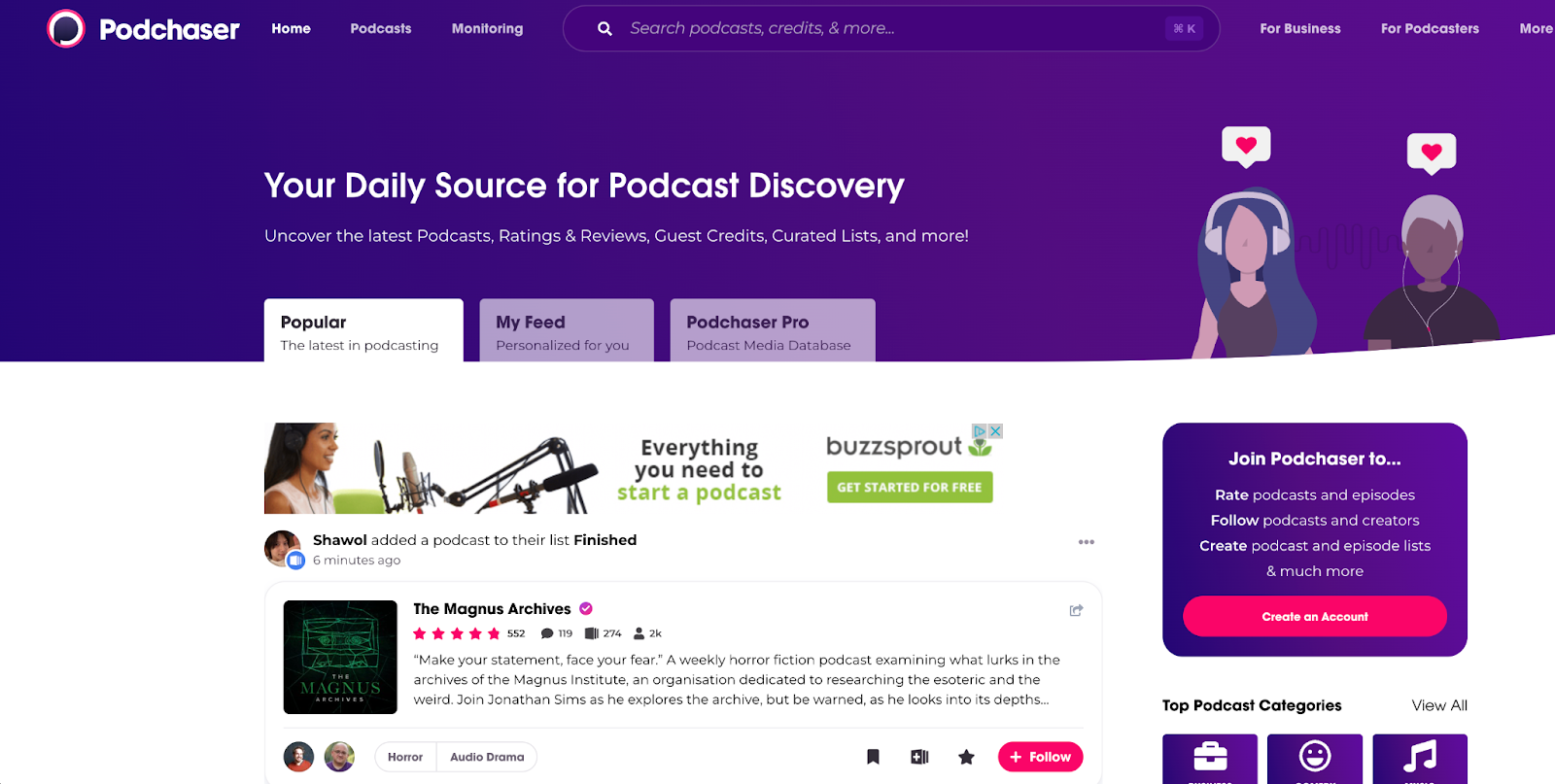
3. Podder
Podder likens their platform to Google Analytics – but for podcasts. The platform gives you a deep dive into your show's insights to pinpoint expansion opportunities, enhance listener engagement, boost advertising revenue, streamline operations, and more. Podder offers tools for advertisers, podcast hosting providers, networks, and individual shows.
Key Features:
- Audience demographics: Includes location, household income, and education level
- Audience enrichment: AI analyzes your podcast audience's personality traits
- Review and chart rankings tracking: Charts can be filtered by country and date. Review reports provided to help you identify your strengths and weaknesses
- Customizable reports: Ideal to send to advertisers or for networks to consolidate all of their shows
- AI-generated audience persona: A composite image of the most prominent components of each characteristic Podder tracks
- Podcast SmartLinks: Podder creates marketing landing pages to promote your podcast across various channels and platforms for your audience’s convenience
Pros:
- Customizable reports
- Tracks reviews and demographics enrichment
- Has SmartLink and other growth tools
- Independent and AI-powered podcast analytics
Cons:
- Not officially IAB-certified
- Ad campaign attribution is only available for enterprise clients
- A few features are still in beta, so they’re unavailable to users
- No podcast hosting features if you’re looking for an all-in-one solution
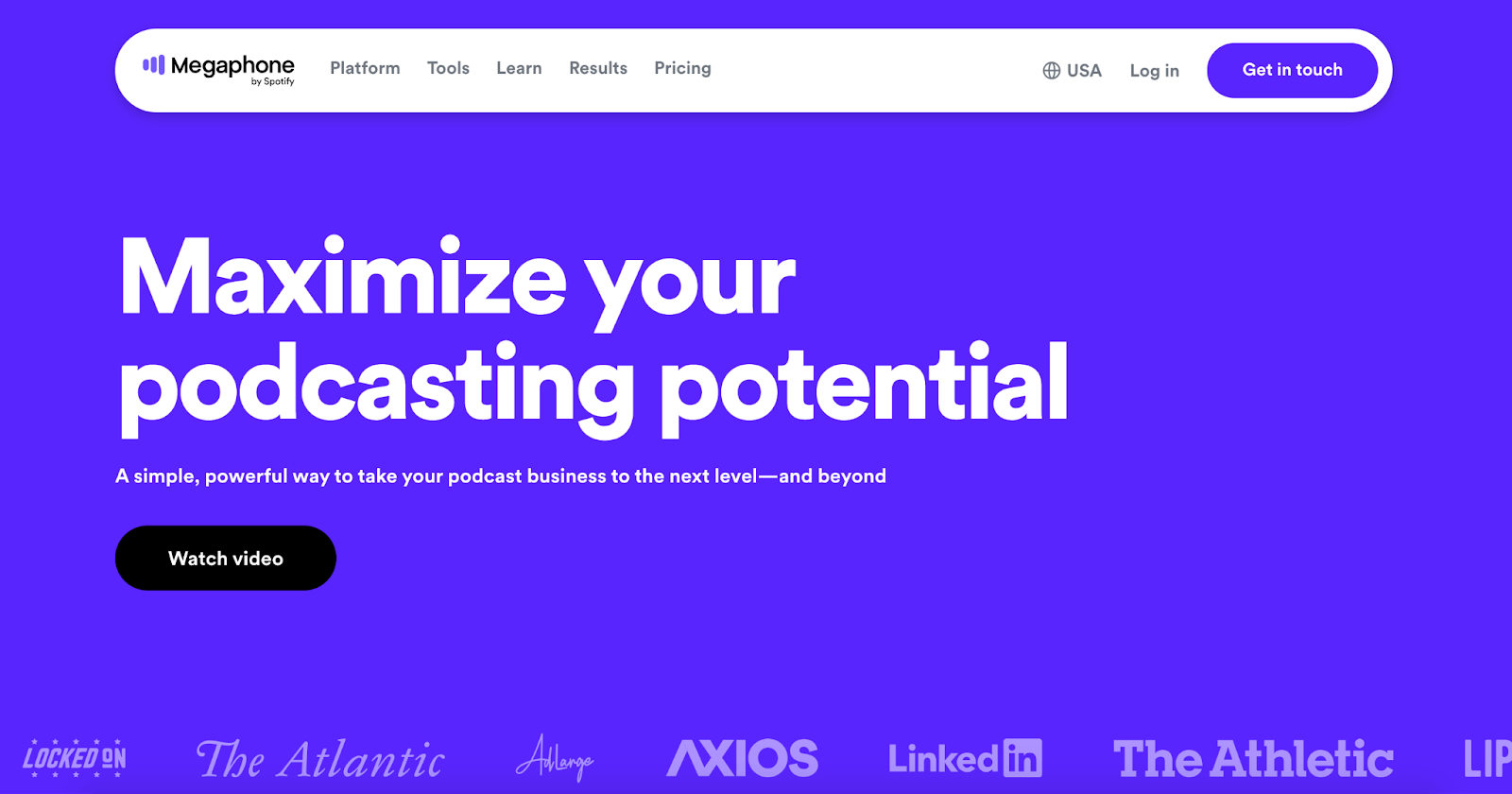
4. Megaphone
Megaphone (by Spotify) is a podcast hosting and analytics tool created for podcasters and brand advertisers. They work with brands like WSJ, Disney, Bloomberg, and LinkedIn, to grow their shows and ad revenue.
Megaphone’s primary focus is on ad targeting and campaign tracking. Their stand-out analytics tools include audience listening, engagement data, and downloads by location.
Key features:
- Podcast hosting: Designed for publishers and networks that work with advertisers
- Monetization: Users have access to the Spotify Audience Network to sell advertising slots in their shows
- Dynamic ad insertion: Includes flexible ad points to maximize revenue and ensure a seamless transition between ads and your content
- Advanced targeting: Megaphone leverages Nielsen to target and measure listeners by purchase intent and demographic down to their zipcode
- Downloads and ad delivery: Filtered by country, region, state, city, and app
Pros:
- Advanced advertising options including dynamic ad insertion and streaming ad insertion
- Robust growth tools including marketing attribution measurement and embeddable media players
- Unlimited users
- Audience insights filtered by app, time of day, and geolocation
Cons:
- No prefix
- Megaphone prioritizes large networks and publishers with shows that have over 20,000 downloads per episode
- Does not support video podcasts
- Limited monetization options. Despite advanced ad capabilities through Spotify Audience Network, other monetization streams are lacking
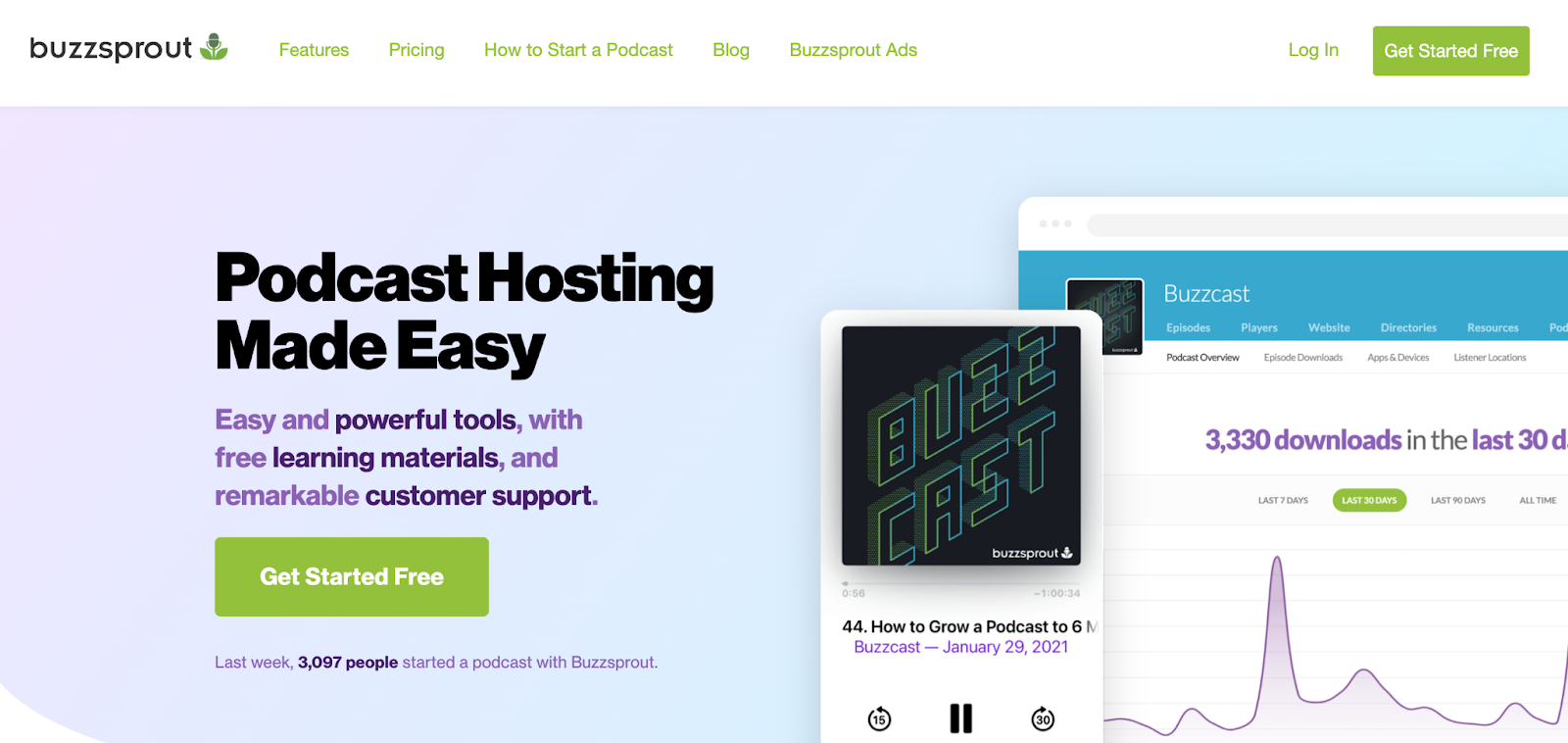
5. Buzzsprout
Buzzsprout gives podcasters the ability to host, promote, and track their podcasts all in one platform. This podcast tool is user-friendly, the platform provides loads of educational resources, and they have a comprehensive customer support system, so it’s a great place to start if you’re a new or indie podcaster.
Key features:
- Embeddable podcast player: The interface looks great and works well on all screen sizes
- Built-in transcription integration: This feature allows you to attach a transcript to any episode within your podcast and then automatically display it on your Buzzsprout site
- In-depth episode analytics: This includes the average number of plays and information about what device your listeners tuned in on and which listening platform they used
- Show analytics over time: These reports include your most popular episodes by plays. They also feature the number of plays your show has gotten in the last 7 days, 30 days, 90 days – and even over the lifetime of your podcast
- Visual assets for distribution and promotion: Buzzsprout lets you create short videos quickly and easily using sound clips from your podcast
- Magic Mastering feature: This tool streamlines the audio editing process and is great for creators and brands who do not have audio engineering experience
Pros:
- Simple set up and easy to use
- Free website included with all paid plans
- Their distribution service makes it easy to distribute your podcast to top podcast directories
- Advanced analytics and monetization options to help grow your podcast like episode-specific data
Cons:
- No prefix
- Limited podcast growth features
- Limited advanced podcast analytics
- Website customization features are limited
- They do not offer monthly unlimited upload plans
- Users lose any unused upload time at the end of the month
- Not geared towards more established brands or publishers
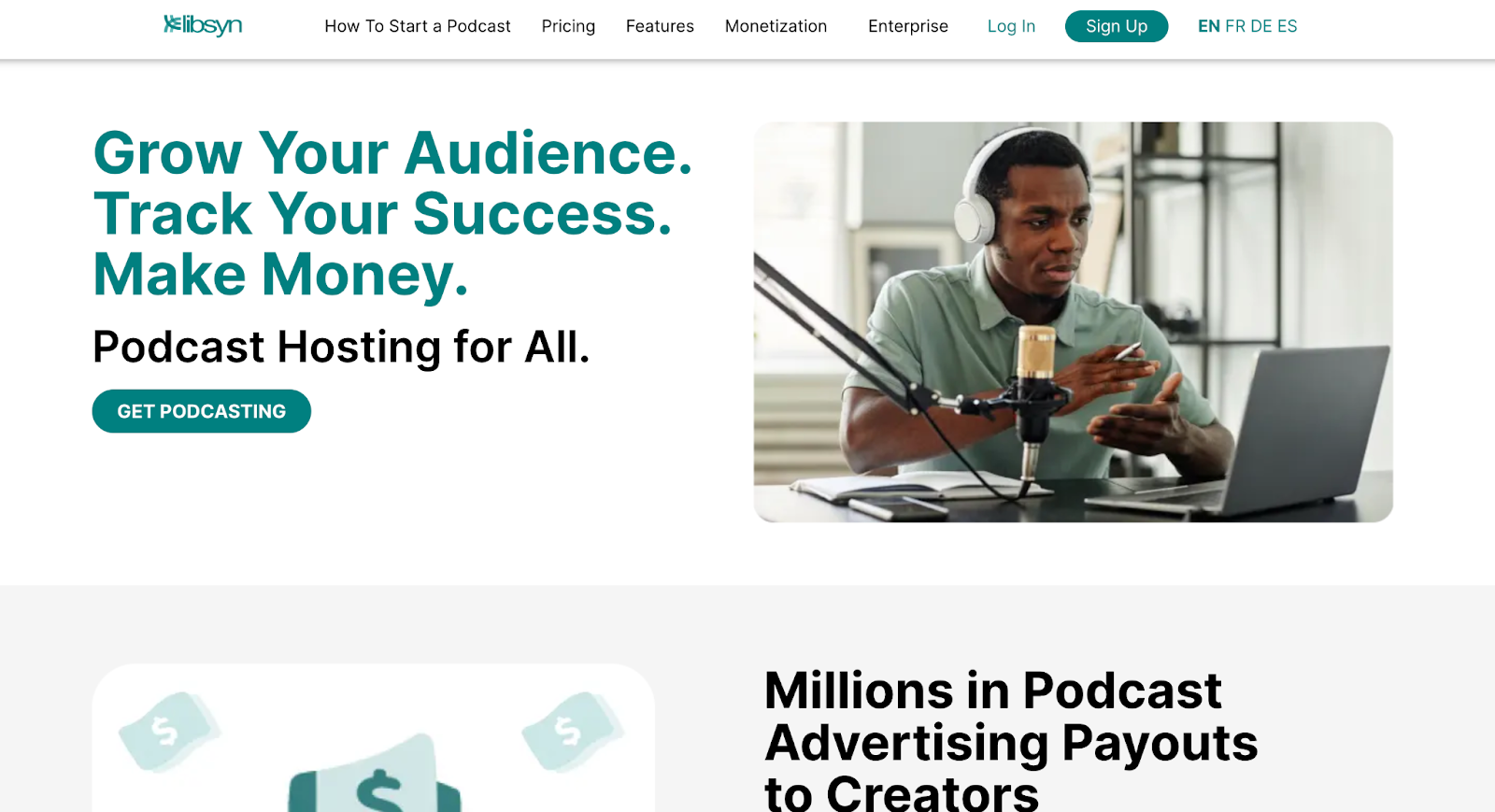
6. Libsyn
Libsyn is a very popular hosting and analytics option for indie podcasters to pro podcasters looking to monetize and grow their shows. Their platform helps you understand your audience and optimize podcast promotion strategies with interactive maps, charts, and insights about fan-favorite apps, players, and destinations.
Key Features:
- ONPUBLISH: Offers integrated publishing options to over 20 of the most popular listening apps
- Podcast subscriptions with GLOW: This integration allows users to easily build subscription membership programs including ad-free content, early access, a members-only newsletter, exclusive videos and courses, and more
- Integrates with Headliner: This integration helps users create short videos to promote their content across social media
- Video publishing options: This allows users to publish their video content without changing hosting providers
- Podcast analytics: For those on the advanced plan, you can access episode-specific data, geographic insights, and day, week, and month stats
Pros:
- Unlimited storage
- Customizable media player
- Supports video and audio podcasting
- Compatible file formats
- IAB-certified
Cons:
- No prefix
- No free planOutdated interface
- No mobile app
- Outdated interface
- Have to pay per podcast
- Limited podcast growth features
- Limited advanced podcast analytics
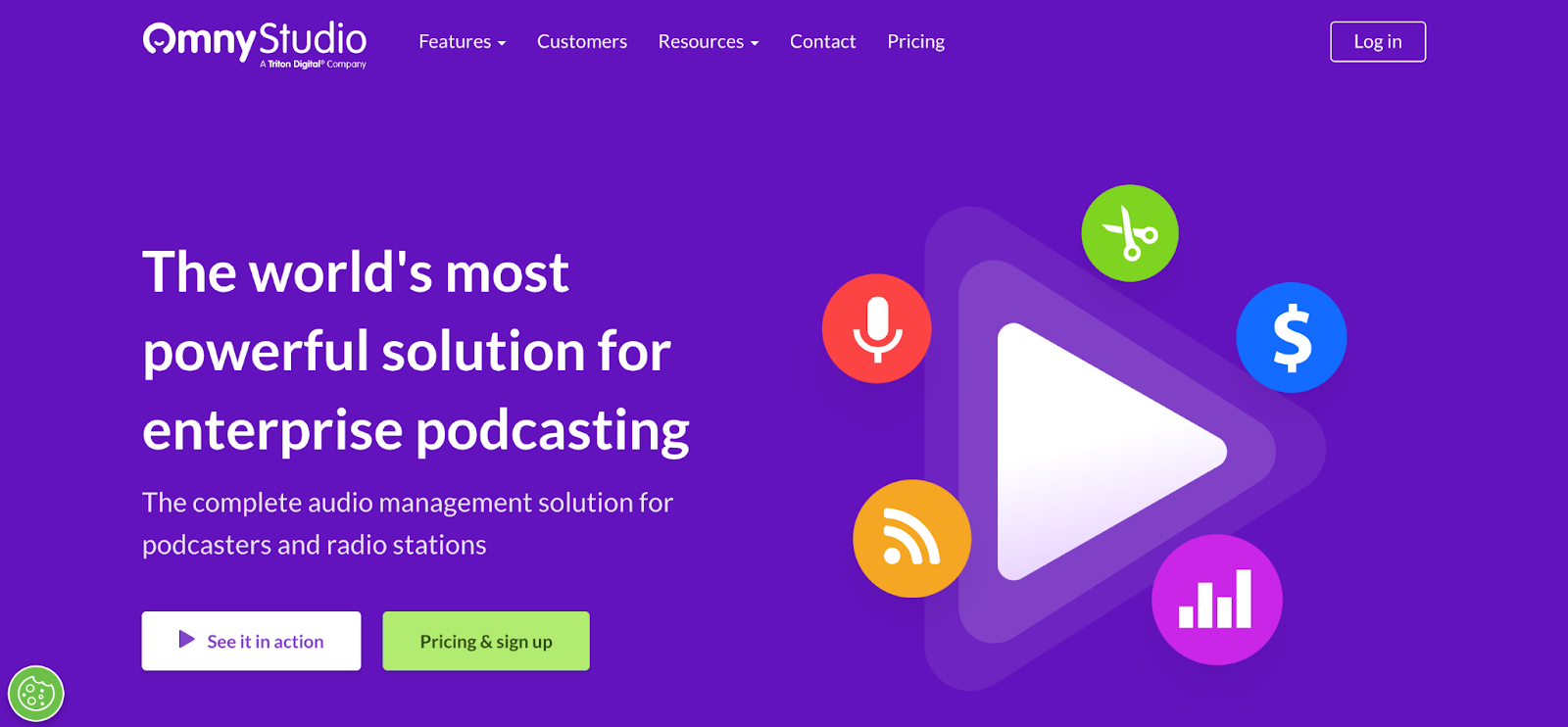
7. Omny Studio
Omny Studio is a comprehensive podcast management platform that caters to enterprise podcasting. They offer a range of tools for content creation, hosting, editing, distribution, promotion, monetization, and analytics. Podcasters and radio networks, such as Monocle, Southern California Public Radio, and Audacy rely on Omny for their podcasting needs.
Key Features:
- Drag and drop audio editor: You can make your audio recordings publishing ready directly from your browser with Omny’s intuitive drag and drop editor
- Radio broadcast capture: Built for podcasters and radio broadcasters, this feature allows you to record and store every “talk break” to add to your searchable content archive
- Twitter card and Facebook open graph: This feature makes social sharing easy, allowing Twitter users to play your content on Twitter from their desktop. The same goes for Facebook
- Transcriptions: Omny allows users to choose between human and machine-generated transcripts
Pros
- Unlimited archive capacity
- Unlimited uploads, episodes, and users
- Built-in editor
- Migration support
- Simple upload and flexible publishing
Cons
- No prefix
- Doesn’t support video
- No automatic podcast website
- Limited podcast growth features
- Limited advanced podcast analytics

8. Simplecast
Simplecast is a great hosting platform for larger brands, working with companies like Facebook, Nike, HBO, and Kickstarter.
Their focus is largely on podcast monetization, offering robust inventory controls, empowering users with the tools to efficiently manage ad placements, set pricing, and oversee the ads seamlessly integrated into their podcast episodes. They also provide immediate access to the Simplecast Marketplace, a dynamic platform powered by AdsWizz.
Key Features:
- Podcast analytics: Get insight into your streams, retention rate, drop-offs, and consumption rate
- Podcast website: A customizable site that allows you to use your own branded domain
- Recast™ tool: Allows you to schedule and share clips of your podcast on social media
- Intelligent web player: Depending on your plan, there are three different types of web players available: Standard Simplecast Audio Player, Simplecast Mini Player, and Simplecast Show Player
- Simplecast 2.0 API: With certain plans, you can create your own, custom podcast experience with your website, listening app, analytics dashboard, and more
Pros:
- Multi-show management
- Private podcasts
- Invite team members and adjust permissions
- One-click publishing
- Podcast website
Cons:
- No prefix
- Download limits
- Does not offer video podcasting
- Limited podcast growth features
- Limited advanced analytics features
- Files are automatically transcoded to mp3
- Unable to monetize directly through the platform
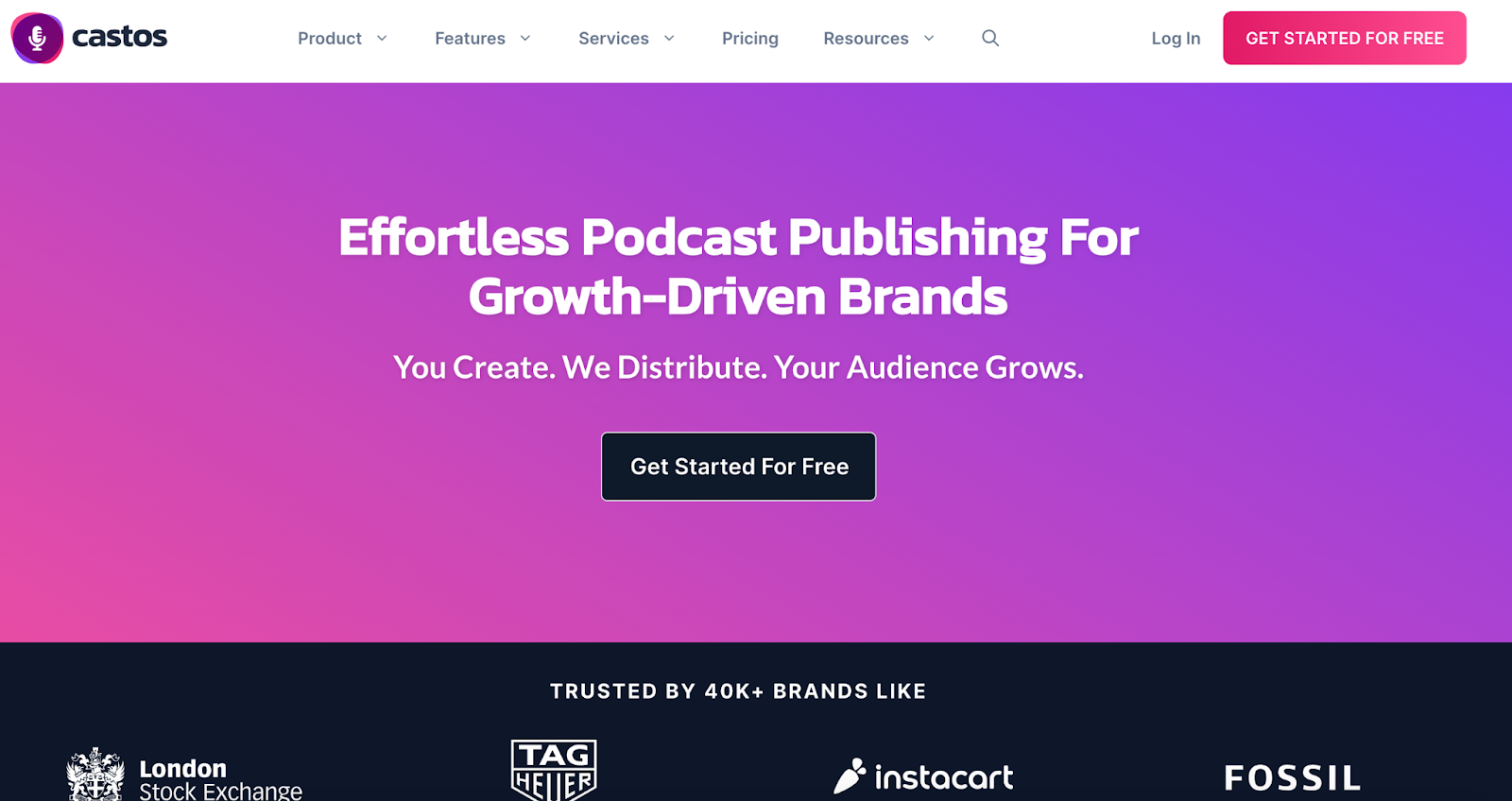
9. Castos
Castos is an easy-to-use platform that tracks podcast performance insights like top episodes, listener behavior, demographics, and more. Castos empowers podcasters to increase engagement, create better content, and nurture sponsors. Brands like Fossil and Instacart trust Castos with their shows.
Key features:
- Custom podcast website: Each plan comes with a podcast website with a responsive design for both mobile and desktop
- Video republishing to YouTube: This automated republishing tool helps podcasters leverage YouTube’s ever-growing userbase
- Podcast player: Embeddable anywhere online, you can customize it to match your branding as well as customize subscriber and social sharing buttons
- Transcriptions: For $0.10 per minute of audio transcription, you can get your show transcribed directly in your dashboard
- Integrations: Integrations include Headliner, Zapier, MemberSpace, Stripe, and Descript to streamline your podcasting workflow
Pros:
- Unlimited podcasts and episodes on every plan
- One-click migration
- WordPress Integration
- Automated YouTube republishing
- Private podcasts
Cons:
- No prefix
- Transcriptions cost extra
- Doesn’t support WAV files
- Limited paying subscribers
- Limited podcast growth features
- Limited advanced analytics features
- Doesn’t have native advertising features
- You can only monetize with private podcasts
- Video podcasting only available in pro subscription
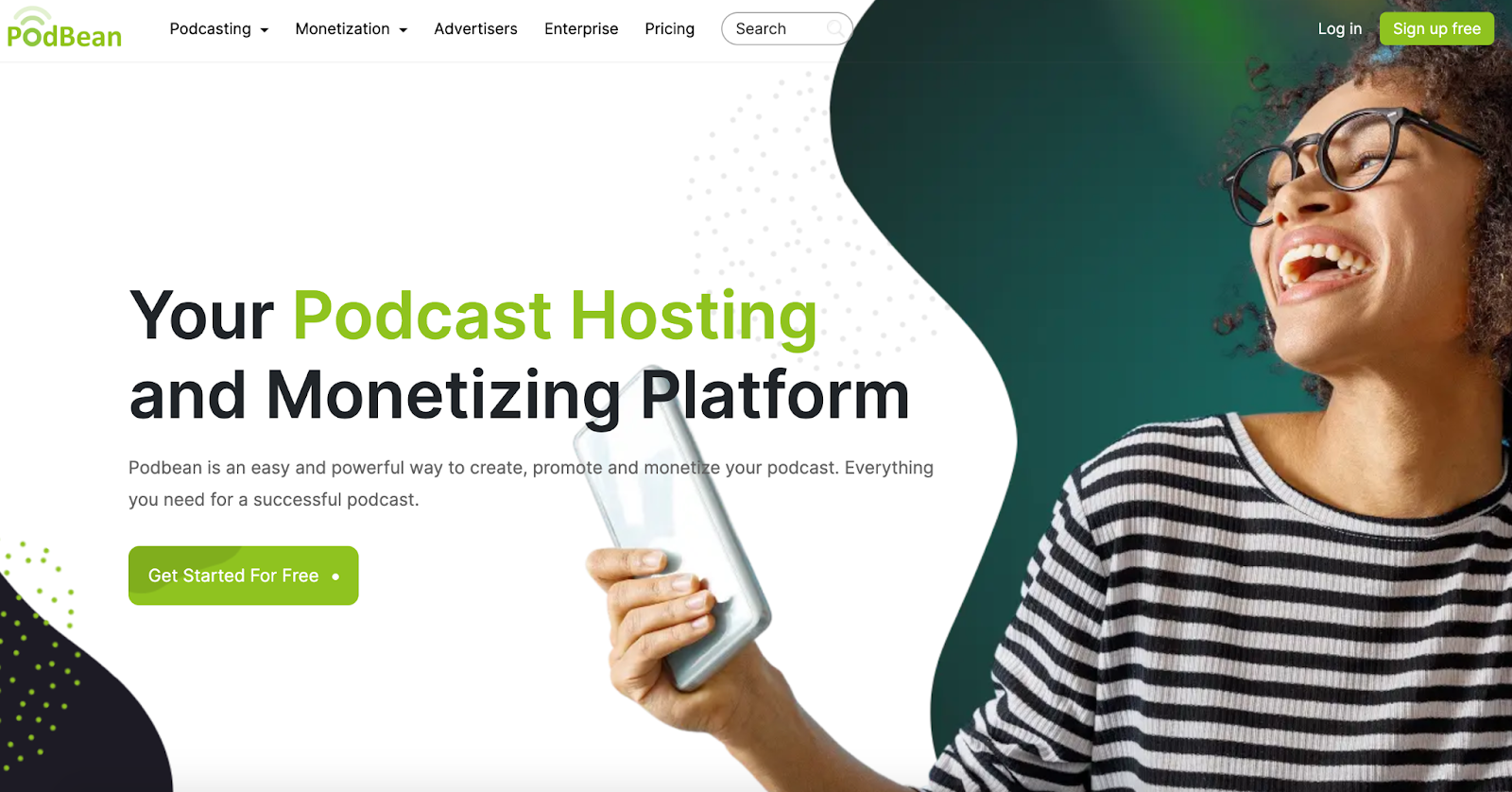
10. Podbean
Last but not least we have Podbean. They’re another popular option for podcast hosting, monetization, and analytics. Users have access to podcast performance insights like unique listeners, downloads, followers, comments, and likes. Additionally, they provide audience demographic information and downloads by listening app.
Key features:
- Built-in monetization options: Including crowdfunding, Apple Podcasts subscriptions, and a marketplace for finding sponsors
- Embeddable players: Coming in different sizes, styles, and colors, embed your podcast into your blog or website
- Social media auto sharing: Connect your social platforms of choice to PodBean for automatic sharing. Plus, generate videos for Facebook, YouTube, and more
- Podbean AI: Leverage AI to help simplify noise reduction, transcriptions, cut-out filler words, and much more
Pros:
- Unlimited bandwidth, storage, and hosting
- Automatic publishing to Apple Podcasts, Spotify, and major podcast directories.
- A user-friendly website builder to create a custom podcast site
- Supports video podcasting
- Live streaming capabilities
Cons:
- No prefix
- Dated UI
- Limited analytics data
- Audio-only live streaming
- Podbean patrons have to use the Podbean app
- No multitrack recording
- Closed captions are an extra cost
Find the right podcast software to level up your show
For brands in audio looking to start 2025 on the right note, these 10 Chartable alternatives offer a diverse range of features, from advanced analytics and monetization options to seamless integration with popular podcasting platforms.
We suggest considering these alternatives to discover new avenues to enhance your show’s impact and optimize your podcasting journey.
If you’re interested in learning more about CoHost and how the platform can help you better understand your audience and grow your podcast, reach out to our team!




.webp)


